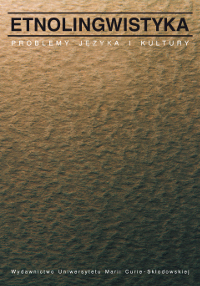Когда ОНИ это уже МЫ, а когда по-прежнему ОНИ? Устный дискурс венгерских сербов
When “they” turn into “us” or remain “them”: Oral discourse of the Serbs in Hungary
Author(s): Marija IlićSubject(s): Anthropology, Language studies, Applied Linguistics, Sociolinguistics, Cognitive linguistics
Published by: Wydawnictwo Naukowe Uniwersytetu Marii Curie-Sklodowskiej
Keywords: oral discourse; Hungarian Serbs; identity; discourse; collective narratives; collective memory; ethnic stereotype
Summary/Abstract: The paper is based on an ethnolinguistic field survey of the Serbs in Hungary (Szigetcsép) conducted in 2001 by the research team of the Institute for Balkan Studies, SASA, Belgrade. The Serbs in Szigetcsép (Hungary) are a demographically endangered population on the verge of assimilation, living for centuries in Serbian diaspora surrounded by German and Hungarian ethnic groups. Therefore, they appear to be an extremely intriguing ethnic group with versatile interethnic relations and diverse discursive strategies for copying with the sensitive topic of “the other”. Two major strategies have been identified: the first is the “embracing device”, when “they” turn into “us” (in relation to other Serbs, Bulgarians or Croats); the other is the “distancekeeping device”, when “we” are in danger of turning into “them” (in relation to Germans and Hungarians).The analysis also deals with narrative constructs, called “collective narratives”, which are based on the patterns of “collective memory” and on ethnic stereotypes.
Journal: Etnolingwistyka. Problemy Języka I Kultury
- Issue Year: 20/2008
- Issue No: 20
- Page Range: 350-366
- Page Count: 18
- Language: Russian

